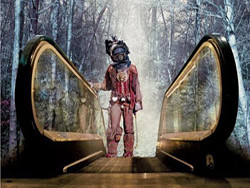Coriander meanders and
Cumin seeds come while
Saffron canary eats
Juniper berry ignoring open
Sesame seed on the ground
Read in halls and stairs of soft, worn marble
he no longer picks sides
left coast, right coast: blue states
great flyover: red states
purple state of my mind: third coast
The Erasure of Place: There's no There, There
The idea that all new suburban residential and commercial developments in this vast terrain are virtually identical...where if the vernacular has not been obliterated completely, it has been co-opted in the most superficial of veneers...has been much discussed, so I will only raise the issue as a focal point of serious meditation...beyond the vulgarity that is the aesthetics of the bottom line. Pods where we plug in...one space undifferentiated from the next...vast organimetric patterns. From this omnipresence of tangible space we move on to...
...the reordering of how we identify that space. Space, place, thing is renamed due to politics, economics, ideology. The culture is then required to reorder their history, identity, aims in reaction to place. Saint Petersburg > Leningrad > Petrograd. Candlestick Park becomes 3Com Park, but how do San Franciscans identify that place...how will they in subsequent generations? One singular entity has the power to re-identify place...to re-order culture. There's unease, and it's all too common so we have to sublimate...we have to laugh. The Who plays Olde Springfield's historic Yahoo! Arena. The mundane...Northern States Power is now X-cel Energy. Geographical considerations are rendered irrelevant and substituted with attitudes of success. Power doesn't come from a plant, it comes from a grid...a matrix, until we finally reach the evolutionary leap where...
...there's no there, there. They taught that to children, explaining cyberspace. She remembered a smiling tutor's lecture in the arcology's executive crèche, images shifting on a screen: pilots in enormous helmets and clumsy-looking gloves, the neuroelectronically primitive "virtual world" technology linking them more effectively with their planes, pairs of miniature video terminals pumping them a computer-generated flood of combat data, the vibrotactile feedback gloves providing a touch-world of studs and triggers. As the technology evolved, the helmets shrank, the video terminals atrophied...no there, there.
— William Gibson, Mona Lisa Overdrive
Cyberspace is where a long distance telephone call takes place, but it's also where the bank keeps your money. Cyberspace is where your medical records are stored. All of this stuff is out there somehow in a relationship to all of the other bits of it, and there's really no point in thinking about its geographical location.
— William Gibson, Interview for Rabid Eye 3, 1995
Project 80 Cabaret Voltaire from The Conversation, 1994. Postscript:
Cyberspace. A consensual hallucination experienced daily by billions of legitimate operators, in every nation, by children being taught mathematical concepts...A graphical representation of data abstracted from the banks of every computer in the human system. Unthinkable complexity. Lines of light ranged in the non-space of the mind, clusters and constellations of data. Like city lights, receding...
— William Gibson, Neuromancer
"When it freezes...the molecules have stopped...it’s clean."
The Ice Storm has been on my watch list for over a year, but given some knowledge of its subject matter, until now, I’ve always said to myself that I wouldn’t be in the mood to watch it. Interestingly, even though I believe I would have viewed this film in the same way a year ago as I did now (as it would have tugged on all of the same memories and attitudes) I don’t think that I would have had been able to articulate my impression of it in as clear a way as I shall attempt to do now. After viewing the film I cannot say that I have learned anything new about our societal heritage or the human condition, but I did gain some new metaphors and new understandings of personification to add to my lexicon. More than anything, I was enthralled by the ice.
This film has a large and impressive cast...very large, and so any kind of in-depth character study is really impossible, but that doesn’t seem to matter, because, all of the characters are portrayed as fairly single-issue and rather interchangeable...that is, all except for Mikey Carver. Is that why he had to die? So in order to make sense of character, a certain abstraction has to be undertaken, and that abstraction delivers up two characters in this film...nature and anti-nature. Yes, the protagonist is really the ice storm itself...one of countless manifestations of nature. The antagonist is 1973 American society...heir to all previous years and progenitor to all subsequent. Let’s take a look and step into that snapshot.
From the beginning we know that the ice storm is coming. It is all over the television. Even the youngest child (those who are less likely to reject mystery) makes prophecy to the impending danger, but the storm is ignored because we are too preoccupied pursuing all of our societal and personal pathologies and aspirations. We are trying to find meaning and fulfillment in a world where the ability to attain those very things has just been compromised in a cultural revolution.
This is why the society is manifest as an anti-nature, because those benefics that are inherent to our human nature have been reordered into malifics. Added to this is the resigned optimism towards our new saviors...technology, psychology, sociology, and the revolution itself...along with the endless drumbeat of freedom and liberation...freedom and liberation ultimately from our own humanity. Through it all, we instinctively resist going along with our liberation...much of what it asks of us is really a bit repulsive. We succumb and we still criticize. No, we’re not hypocrites as long as we really believe.
Although animate, the ice storm is not sentient, and so it is oblivious to us. The storm is also a metaphor reflecting the culture that it is slowly enveloping...oblivious to what it is, developing unrelentingly one seeming innocuous layer after another, until some lives go spinning and sliding out of control while others become entombed in glass...that is until the final snap under the weight of it all. To this day, some have not yet experienced the snap...
...but for others there is melting...not only of ice, but of hearts.
Just an Arc
Beware then when the great God lets loose a thinker on this planet. Then all things are at risk. It is as when a conflagration has broken out on a great city, and no man knows what is safe, or where it will end. There is not a piece of science but its flank may be turned tomorrow; there is not any literary reputation, not the so-called eternal names of fame, that may not be revised and condemned. The very hopes of man, the thoughts of his heart, the religion of nations, the manners and morals of mankind are all at the mercy of a new generalization.
— Ralph Waldo Emerson, Circles
Version: Failures
Don't speak of false messiahs — failure of the modern man
To the centre of our life's desires — as a whole not an also ran
Love in a hollow field — made the image of your father's son
Drawn to an inner feel — he was thought of as the only oneHe no longer denies — all the failures of the modern man
He no longer picks sides — sees the failures of the modern man
Wise words and sympathy — tell the story of our history
New strength gives a real touch — sense and reason make it all too much
With a strange fatality — fade the spirits of a lesser man
Some other race could see — in his way he was the only oneHe no longer denies — all the failures of the modern man
No, no his God decides — sees the failures of the modern man
Now that it's right to decide — in his time he was a total man
Taken from Caesar's side — kept in silence just to prove who's wrong
No, no his God decides — all the failures of the modern man
No, no longer denies — all the failures of the modern man
shot twice and blown up
thomas,
you have lost the body
the body that was in the park
only to find in its place
a car full of mimes
lentis | レンズ | Optik | линза | lens | φακός | 名 | objectif | lente
No matter how you spell it, we all have one. Actually, we all have many lenses and each of them undergo changes over time…retooling. Now I really often despise putting ideas into words, not because many ideas are all that complicated, but because they are often so simple and the hearer of such an idea wants to attach all manner irrelevant or incorrect meaning to the idea from the vaults of their own beliefs.
This results for me in complete frustration. It’s like Cinderella’s stepsisters when they tried to fit their feet into the rigid confines of the glass slipper. They had to cut away parts and still their feet didn’t fit right. What they ended up with was a painful, bloody mess. Yes, that’s it. My ideas are like the pudgy feet of greedy young women. Well, not really, but it brings into better view the concept that some ideas that may seem rigid may not necessarily be so. Maybe it is our (in)ability to express and to hear those ideas and the confines of our languages that are rigid.
There are two points in this that we should remain conscious of. The first is that of the habit of listening where we add to what is being said and thereby change the meaning of what is being said. We add from the deep wells of our fundamental assumptions and from our moods. The other is when we remove essential parts of the idea. Usually what gets tossed out or neglected is that part of nuance that is hardest to put into words but is critical to bringing the idea into sharpest focus, but most shamefully, nowadays what is eliminated is usually done for political reasons whether consciously or not.
Good question. Let’s find out together. I should start with why I’m presenting the principle of the lens, as it really should be a fairly self-evident idea, and why I think that it is important that I should do this. I begin with the recognition of the tension between philosophical paradigms…namely that of absolutism and relativism. The tension between these two paradigms is increasing, and even though it may sound rather abstract and of little practical importance, I believe that it is this tension (as well as the very nature of definition itself) that is one of the primary roots of our most divisive and intractable societal issues today, and this is most important in understandings and discussions of what is intrinsically true and what is false, and the increasing tension in our society is not simply an academic matter.
Absolutism has been the paradigm in the western philosophical tradition ever since the ancient Greeks determined that, yes, reality is indeed real. Absolutism doesn’t maintain that everything is known or that everything is necessarily knowable, but it does maintain that truth in the matter of ethics (and subsequently law) that is objective and universal does exist. This was a rather unchallenged position until the mid twentieth century when a whole host of factors such as agnosticism, nihilism, post-war ennui, over reliance and faith in science with its subsequent disillusionment, cultural difference apparent in a shrinking world, academic inbreeding, the devil in a blue dress…Who knows for sure…resulted in postmodernism, where ethics and therefore law are entirely situational and subjectively determined.
Sweet, sweet relativism was always a pipe-dream, because absolute relativism is, well, an absolute. What really happened was the trading in of all of the old Sacred Cows for new and diametrically opposed ones, yet coo-coo-cooing relativism is still trotted out to dull the mind and breed cultural schizophrenia. This is the heart of the paradigmatic tension. One lexicon that illustrates this states:
war is peace
freedom is slavery
ignorance is strength
The updated lexicon would add:
intolerance is tolerance
pride is liberation
subjectivity is objectivity
Anyway, the principle of the lens is a useful alternative to relativism in reconciling obvious interpersonal and intercultural difference with ethical absolutism, while still maintaining that ethical truth is objective and universal. A lens is a device through which an individual views objective reality, and while more than one can be used simultaneously, the lens will color, inform, distort, nuance, sharpen, etc. that individual’s view of reality, but as always, reality and truth are independent of how and by whom they are viewed.
The basis of the lens is perception. At the lowest level the five sensory input modes along with the brain use physiologic matter to input raw (objective) information into human consciousness. This concept is readily recognizable to anyone who didn’t sleep through Psych 101 so I won’t go into any detail, but it is very important to keep in mind that the individual’s cognitive abilities as well as their affective state places limits and erects filters in what each person perceives and how those perceptions are processed. Such is the foundation, but I am really interested in the transpersonal…whether in psychology or anthropology (mythology, social systems, arts & literature, and finally pop culture).
In some circles, cultural conditioning and social constructs are looked upon as bogeymen. This is usually by those who frequently brandish terms such as hegemony and patriarchy. It seems that the complaint goes like this: all cultural knowledge (conditioning and constructs, practices and traditions) pollutes and prevents the individual from being who he is truly meant to be. Yikes, but what is a human void of cultural information? He is either a blank and blinking empty computer ripe for their programming or an animal that has had no interaction with any other human. Its seems to me that the secularist view of who a person truly is (that is existing in a world without universal boundaries) is a disturbing world of machines and beasts…such then will be our fates in this worldview, that is a view that lacks a transcendent purpose for individuals, a view that lacks objective truth, a view that lacks God.
Now that we have passed through that tangent, let’s look at conditioning, because it is an essential fashioner of many lenses. Basically it is instruction and repetition. For example, if peasants introduced to the modern world are told enough times that a toilette is used to relieve themselves in, hopefully, soon enough they will stop washing their olives in it. Likewise, if a particular behavior repulses a person, but they are told many times a day for several years that that behavior is instead beautiful and good, they will likely become conditioned. So when someone comes along and tells them once again that it is repulsive, they will likely think that person wrong, crazy, or that modern buzzword, unenlightened. Their response might even be hostile or threatened. Conditioning doesn’t need to answer to objectivity.
Physio-psychological makeup, affective state, and cultural conditioning are more or less all Built-in Lenses, because either we cannot change them, we are unaware of them, or they are part of taken for granted belief systems. Yes, even the most hardened atheist or that hugely common group of people who say that they are “spiritual but not religious” have a belief system with many hard and fast conditioned rules and beliefs as dogmatic as any fundamentalist. You see, if it is true that nature abhors a vacuum as the physicists inform us, then is it even more true that super-nature abhors a super-vacuum?
Selected Lenses on the other hand, are largely chosen, although they may be informed by those that are built in. These are the subjects that we chose to learn or the methods that we chose to employ, and through which we begin our understanding the world around us in a systematic way. I chose to study, architecture & urban design, geography, art & history, anthropology, archaeology, and belief systems. I have also come to understand that pop culture (in spite of much of its trashy low-browness) is a rich source of information. I can use each of these to study any of the others or anything else that comes across my path. Awareness of what we do, why and how we do it is as essential to scraping away the layers of subjectivity and misinformation that obscure our view of truth as is availing ourselves to those best sources.
Everything that I have been exposed to is retained within deep vaults…all of my personal experiences, everything that I have read, all the music I have heard, and all of the films and television that I have seen. These things form who I am in the sense of my history, and they are also lenses, but more than that, they are a palette through which I express my thoughts…at times in the manner of a collage of samples that is likely to be meaningless to those uninitiated in the references used.
I disagree that it’s all relative, but I do believe that it’s all referential.


